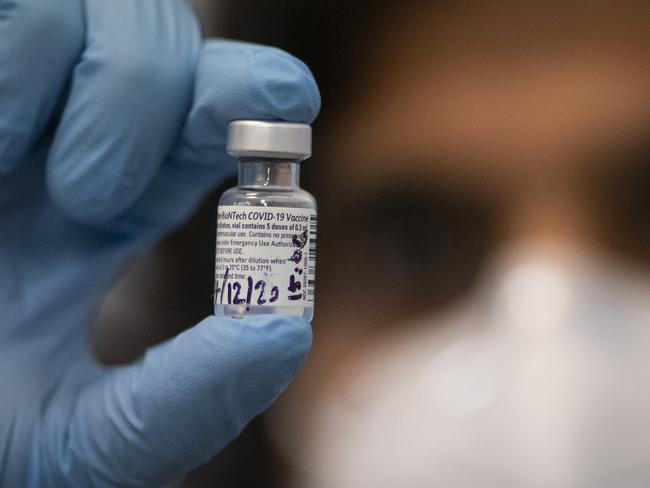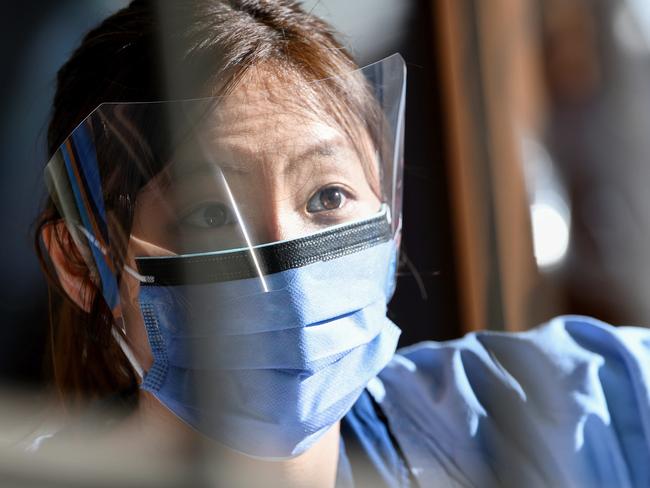COVID-19 vaccine: Crucial details you must know
From who will get it first, to side effects and what treatments will be available in Australia, this is what you must know about the COVID-19 vaccine.
Coronavirus
Don't miss out on the headlines from Coronavirus. Followed categories will be added to My News.
From who will get it first, to side effects and what treatments will be available in Australia, this is what you must know about the COVID-19 vaccine.
WHO GETS IT FIRST?
The first vaccines against COVID-19 have been approved for use overseas but there are not enough vaccines to protect everyone who wants a jab so governments have set up priority groups.
AUSTRALIA
In Australia the independent Australian Technical Advisory Group on Immunisation (ATAGI) has set the following priorities and these have been adopted by state and federal governments:
The first to get the vaccine will be people who have an increased risk of developing severe disease or dying from COVID-19 including 3.8 million older people, people with certain pre-existing underlying medical conditions and Aboriginal and Torres Strait Islander people.
Also given priority will be people at an increased risk of infection and transmission of COVID-19. This includes about 800,000 health and aged care workers, group residential care workers and disability care workers, Australia’s 41,000 prisoners and the staff that guard them as well as detainees and workers in detention facilities, and people working in meat processing plants.

The next priority groups include people working in critical services and at increased risk of developing severe disease. This will include emergency services providers, 60,000 defence force personnel, public health staff and staff managing quarantine facilities, the more than 50,000 people working in supply and distribution of essential goods and services such as food, water, electricity, telecommunications as well as those at risk of exposure, being infected with and transmitting the virus and those working in services critical to society functioning.
The government has yet to outline which groups will be next in line and it is under pressure to make teachers a priority. The Government has promised everyone who wants to will be vaccinated by the end of 2021.
Most vaccines have not been tested in pregnant women on children so it is unlikely they will be approved for use in these groups until safety testing is completed.
UNITED STATES
In the US, the nation’s 21 million health care workers and 3 million aged care residents are among the first groups to receive the COVID-19 vaccine that was rolled out on Monday.
Next in line will be 87 million essential workers and then 53 million people aged 65 and older and adults with health conditions that put them at risk of the coronavirus.
These essential workers include people working in meat packing plants and other food processing facilities, police and firefighters, teachers and transport workers.
UNITED KINGDOM
The United Kingdom began vaccinating people last week and it too has prioritised the elderly and frontline health care workers.
It has a detailed plan that prioritises the elderly into five year age bands with the oldest to be vaccinated first.
The first people vaccinated will be the 3.4 million aged over-80s and the 500,000 workers in care homes and 3.8 million frontline health workers, including the vaccinators themselves.
Next in line are the 2.4 million aged 75 -80, when that is complete those aged 70 and over and anyone clinically vulnerable will get the vaccination.
Then it will be the turn of those aged 65 and over along with 16-64 year olds with underlying health conditions.
After that those aged 60 and over will become eligible followed by those aged 55 and over, then aged 50 and over
Once these groups are vaccinated the vaccine will be offered to the other groups in the population.
Pregnant women and children under the age of 16 will not get the vaccine because it has not been tested in these groups. Exceptions will be made for children at high risk of COVID-19.
WHEN WILL AUSTRALIANS GET THE VACCINE?
No vaccines have yet been approved for use in Australia. The medicines watchdog the Therapeutic Goods Administration is expected to approve vaccines for use in January.
The vaccination program is slated to begin in March.
The first batch of the AstraZeneca vaccine being produced in CSL’s Melbourne plant is due to be ready by New Year.
Pfizer will not deliver doses of the vaccine to Australia until well into next year.
HOW MANY SHOTS OF THE VACCINE ARE NEEDED?
The three leading vaccine shots all require two jabs to fully protect people from COVID-19.
Pfizer’s vaccine requires to jabs three weeks apart, Moderna’s vaccine requires to shots four weeks apart.
The Oxford/AstraZeneca vaccines requires two shots 28 days apart.
Johnson and Johnson is developing a one shot vaccine that is currently in final stage testing and it hopes to seek regulatory approval early next year.
DO YOU NEED TWO SHOTS OF THE SAME VACCINE?
With multiple vaccines available it is vital people who are vaccinated ensure they receive two shots of the same vaccine to be protected. Patients may not be properly protected if they get one shot of the Pfizer vaccine followed by a shot of the AstraZeneca vaccine.
The Australian Government is planning to record the bar code of every vaccine injected against the patients name on a vaccination record to ensure they get two vaccines from the same manufacturer. This record system will also be used to monitor any adverse events.

WILL YOU NEED TO HAVE REGULAR COVID-19 VACCINES?
It is not known how long the COVID-19 vaccine will protect people from the virus. It is possible an annual vaccination will be needed similar to the flu vaccination.
ARE THERE SIDE EFFECTS?
Many people have reported minor side effects from the COVID-19 vaccine similar to those from the flu shot. These include a sore arm near the vaccination site, headaches, mild fevers, body aches and pains. These are a sign your immune system is responding to the vaccine and that it is working.
In the UK two nurses who suffered from severe allergies developed an allergic reaction to the Pfizer vaccine but recovered quickly. UK authorities have advised that people who carry an epipen for severe allergies should not have the Pfizer vaccine.
WHAT VACCINES WILL BE AVAILABLE IN AUSTRALIA?
Australia had agreements to purchase four COVID-19 vaccines but these options shrank to just three after the University of Queensland vaccine was cancelled last week.
Australia has a deal to secure 10 million doses of the Pfizer vaccine which is being rolled out in the US and UK. This will be enough to vaccinate 5 million people.
The government increased its order for the Oxford/AstraZeneca vaccine to 53 million doses last week. This vaccine is being produced in Melbourne by CSL.
Orders for the Novavax vaccine were also increased to 51 million doses after the University of Queensland vaccine was stopped. This vaccine is still undergoing clinical trials.
We are also part of an international vaccine partnership called Covax which aims to distribute multiple vaccine supplies around the world.
WILL VACCINATIONS BE COMPULSORY?
No. The vaccine will be free and available to everyone but the government will not force Australians to have it. The government’s vaccine policy states: “While the Australian Government strongly supports immunisation and will run a strong campaign to encourage vaccination, it is not mandatory and individuals may choose not to vaccinate.”
WILL YOU NEED TO BE VACCINATED TO TRAVEL OVERSEAS?
People wishing to travel overseas may need to be vaccinated.
“There may however, be circumstances where the Australian Government and other governments may introduce border entry or re-entry requirements that are conditional on proof of vaccination,” the government’s vaccination policy states.
Qantas CEO Alan Joyce recently signalled international travellers will have to have COVID-19 vaccine to get on a flight.
It is unclear at this stage whether the government will be satisfied a person is safe to enter Australia if they received a COVID-19 vaccine made in China or Russia.



